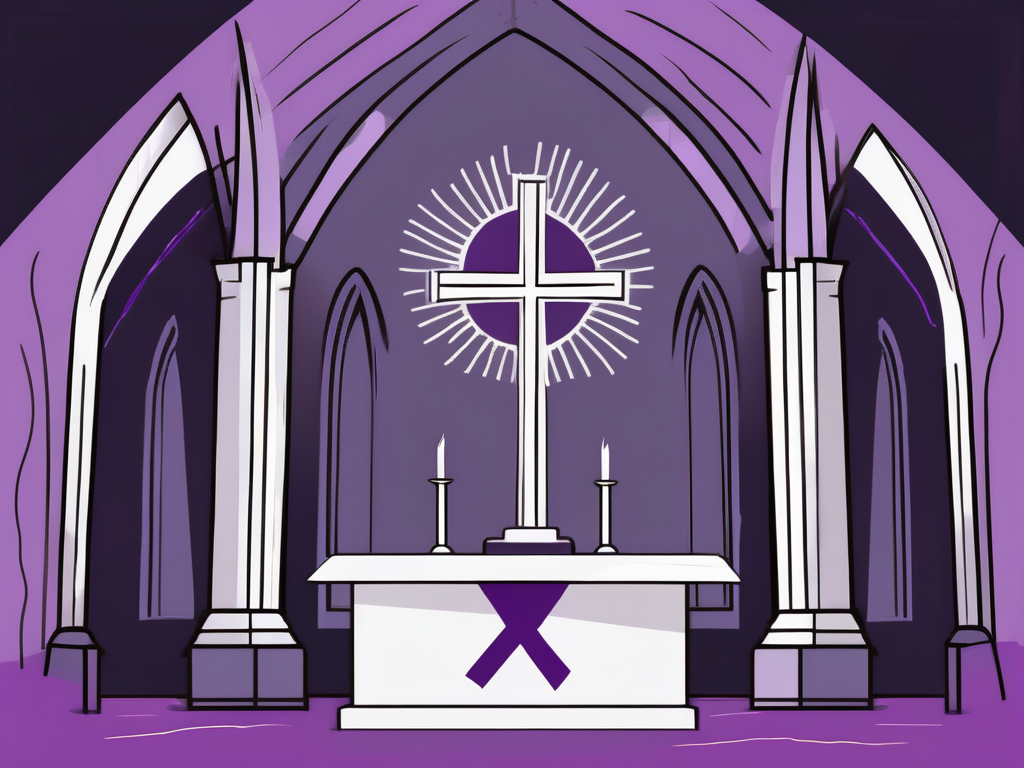Lent is a significant period in the Christian calendar that holds great importance for believers around the world. It is a time of reflection, preparation, and spiritual growth that leads up to Easter, the celebration of the resurrection of Jesus Christ. In this article, we will explore the concept of Lent, its traditions and practices, key events, purpose, and address some common misconceptions.
Understanding the Concept of Lent
Lent originated as a period of fasting and repentance in preparation for baptism for early Christians. Over time, it has evolved into a season of self-reflection, spiritual discipline, and renewal. The word “Lent” itself comes from the Old English word “lencten,” meaning “springtime,” reflecting the season of the year when it occurs.
During Lent, believers engage in various practices such as fasting, prayer, and acts of charity. These practices are meant to help individuals detach themselves from worldly distractions and focus on their relationship with God. By sacrificing certain pleasures and dedicating more time to prayer and contemplation, believers seek to deepen their spiritual connection and grow closer to God.
The Biblical Basis of Lent
Although the word “Lent” is not explicitly mentioned in the Bible, the concept of a period of preparation and fasting can be found throughout Scripture. For example, Jesus spent forty days and nights fasting in the wilderness before beginning His public ministry. This period of self-denial and intense prayer serves as the basis for the forty-day duration of Lent.
During this time, believers are encouraged to emulate Jesus’ example by engaging in acts of self-discipline and self-reflection. By following in His footsteps, they hope to draw closer to Him and experience personal transformation.
The Significance of the 40 Days
The forty-day duration of Lent is symbolic and holds multiple meanings. It represents the forty years the Israelites spent wandering in the desert and Jesus’ forty days of fasting in the wilderness. It also corresponds to the forty hours Jesus spent in the tomb before His resurrection.
Throughout history, the number forty has been associated with a period of testing, purification, and preparation. It signifies a time of trial and growth, leading to a new beginning or a significant event. By observing Lent for forty days, believers participate in this symbolic journey of transformation.
During Lent, believers are encouraged to examine their lives, identify areas of sin and weakness, and seek forgiveness and reconciliation. It is a time to reflect on one’s own mortality and the need for redemption. Through prayer, fasting, and acts of charity, individuals strive to purify their hearts and renew their commitment to living a life aligned with God’s will.
As believers journey through Lent, they are reminded of the ultimate sacrifice Jesus made on the cross for the forgiveness of sins. The season culminates in Holy Week, a time of intense reflection on Jesus’ suffering and death, leading to the joyous celebration of His resurrection on Easter Sunday.
Overall, Lent serves as a profound opportunity for believers to deepen their faith, grow spiritually, and prepare their hearts for the celebration of Easter. It is a time of introspection, repentance, and renewal, inviting individuals to draw closer to God and experience His transformative power in their lives.
The Traditions and Practices of Lent
Lent is a season filled with various spiritual disciplines that help believers draw closer to God. It is a time of reflection, self-examination, and preparation for the celebration of Easter. Two primary practices observed during Lent are fasting and abstinence.
Fasting and Abstinence
Many Christians choose to fast during Lent, typically by abstaining from certain foods or activities as a way of denying themselves and focusing on their spiritual growth. This practice helps individuals to develop discipline, self-control, and a deeper reliance on God. Fasting is not just about giving up something for the sake of it, but rather a deliberate act of sacrifice and devotion. By abstaining from certain foods, believers are reminded of the suffering of Christ and the importance of spiritual nourishment.
During Lent, some people choose to abstain from indulgences such as entertainment or social media. By doing so, they create space in their lives for more meaningful activities and focus on their relationship with God. This intentional break from distractions allows believers to redirect their attention towards prayer, reflection, and acts of service.
Prayer and Reflection
Prayer is an essential aspect of Lent, offering believers a chance to connect with God on a deeper level. Many people incorporate additional prayer practices into their daily routine, such as participating in prayer groups or observing specific prayer times. This intentional focus on prayer helps individuals to cultivate a more intimate relationship with God and seek His guidance for their lives.
Reflecting on one’s personal relationship with God and seeking His guidance for the future are also common practices during this season. Lent provides an opportunity for believers to examine their hearts, confess their sins, and seek forgiveness. It is a time of repentance and renewal, as individuals strive to align their lives more closely with God’s will.
Additionally, many churches offer special Lenten services and devotional materials to guide believers through this season. These resources often include scripture readings, meditations, and reflections that encourage spiritual growth and self-reflection. Participating in these communal practices can foster a sense of unity and shared purpose among believers.
Overall, Lent is a time of intentional spiritual growth and preparation. Through practices such as fasting, abstinence, prayer, and reflection, believers seek to deepen their relationship with God and align their lives with His purposes. It is a season of self-discipline, self-examination, and renewal, as individuals strive to live more fully in the light of Christ’s sacrifice and resurrection.
The Key Events During Lent
Lent encompasses several key events that hold special significance in the Christian faith. These events provide believers with opportunities for reflection, repentance, and spiritual growth.
Ash Wednesday
The season of Lent kicks off with Ash Wednesday, which marks the beginning of the forty-day period. On this day, believers attend a worship service where a minister or priest applies ashes to their foreheads in the shape of a cross. This act symbolizes repentance, humility, and mortality, serving as a reminder of our dependence on God.
As the ashes are applied, the minister or priest may recite the words, “Remember that you are dust, and to dust you shall return.” This powerful reminder of our mortality encourages believers to reflect on their lives and seek forgiveness for their sins.
During the season of Lent, many Christians choose to engage in acts of self-denial and sacrifice as a way to draw closer to God. This may involve fasting, giving up certain luxuries, or dedicating more time to prayer and meditation.
Palm Sunday
Palm Sunday, which falls on the Sunday before Easter, commemorates Jesus’ triumphant entry into Jerusalem. Believers often participate in church services where palm branches are distributed, recapturing the excitement and adoration of the crowd that welcomed Jesus into the city.
As they wave palm branches, believers are reminded of the hope and joy that accompanied Jesus’ arrival in Jerusalem. This event foreshadows the events of Holy Week and serves as a reminder of the ultimate sacrifice that Jesus would make for humanity.
In some traditions, the palm branches used on Palm Sunday are saved and burned to create the ashes used on Ash Wednesday of the following year. This practice symbolizes the cycle of life, death, and resurrection that is central to the Christian faith.
Holy Week
Holy Week refers to the final week of Lent, beginning with Palm Sunday and culminating in Easter Sunday. During this week, Christians reflect on the significant events leading up to Jesus’ crucifixion, such as the Last Supper, Jesus’ betrayal and arrest, His trial, crucifixion, and burial.
The Last Supper, which took place on Maundy Thursday, holds deep significance for Christians. It was during this final meal with His disciples that Jesus instituted the sacrament of communion, symbolizing His body and blood. Believers often participate in communion services during Holy Week to remember and honor Jesus’ sacrifice.
Good Friday, observed on the Friday before Easter, is a solemn day of remembrance and mourning. It commemorates Jesus’ crucifixion and death on the cross. Many churches hold special services on this day, focusing on the suffering and sacrifice of Jesus.
As Holy Week comes to a close, Christians gather on Easter Sunday to celebrate the resurrection of Jesus. This joyous occasion marks the triumph of life over death and serves as the foundation of the Christian faith.
Throughout Lent, believers are encouraged to engage in prayer, self-reflection, and acts of service. It is a time of spiritual renewal and preparation for the celebration of Easter, the most significant event in the Christian calendar.
The Purpose and Meaning of Lent in Modern Christianity
In modern Christianity, Lent serves several purposes and holds deep personal meaning for believers.
Lent, derived from the Old English word “lencten” meaning “springtime,” is a season of reflection and preparation leading up to Easter. It is observed by various Christian denominations, including Catholics, Orthodox Christians, and some Protestant churches.
During this solemn period, believers engage in practices such as prayer, fasting, and almsgiving as a way to draw closer to God and grow in their faith. These practices are not meant to be burdensome or legalistic, but rather opportunities for personal growth and spiritual renewal.
Personal Growth and Spiritual Renewal
Lent provides a designated period for believers to focus on personal growth and spiritual renewal. Through prayer, reflection, and fasting, Christians seek to deepen their faith, renew their commitment to God, and break free from distractions or harmful habits impeding their relationship with Him.
During Lent, believers often set aside additional time for prayer and meditation. They may participate in daily devotions, attend special church services, or engage in spiritual retreats. These practices help individuals cultivate a deeper connection with God, allowing them to experience His presence and guidance in their lives.
Fasting is another significant aspect of Lent. By abstaining from certain foods or activities, believers practice self-discipline and self-control. This act of self-denial serves as a reminder of Jesus’ sacrifice and helps believers refocus their priorities on their spiritual journey.
Furthermore, Lent encourages believers to engage in acts of service and charity. Through almsgiving, individuals are reminded of the importance of generosity and compassion towards others. This can involve donating money or resources to those in need, volunteering at local charities, or simply showing kindness and love to those around them.
Preparing for Easter
Lent offers an opportunity to prepare our hearts and minds for the joyous celebration of Easter. By journeying through the suffering, sacrifice, and resurrection of Jesus Christ, believers gain a deeper understanding and appreciation of the immense love and grace displayed through His ultimate sacrifice on the cross.
During Lent, believers reflect on Jesus’ forty days in the wilderness, where He faced temptation and overcame it. This period of reflection reminds Christians of their own struggles and the importance of relying on God’s strength to overcome challenges and grow spiritually.
As Easter approaches, the focus of Lent shifts to the passion and death of Jesus. Believers meditate on the Stations of the Cross, a series of fourteen events depicting Jesus’ journey to Calvary. This practice allows individuals to walk alongside Jesus in His suffering and reflect on the significance of His sacrifice for humanity.
Ultimately, Lent culminates in the celebration of Easter, the resurrection of Jesus Christ. Through the observance of Lent, believers are better prepared to fully embrace the joy and hope that Easter represents. The period of reflection and spiritual growth during Lent enhances the experience of the resurrection, leading to a deeper appreciation of God’s love and the redemption offered through Jesus’ sacrifice.
Common Misconceptions About Lent
Despite its widespread practice, there are some common misconceptions about Lent that deserve clarification.
Lent as a Period of Mourning
While Lent is a solemn and reflective season, it is not primarily a period of mourning. Rather, it is a time of repentance, renewal, and spiritual growth. It is a season of hope, leading to the celebration of Christ’s victory over sin and death.
The Obligation of Fasting
While fasting is a traditional practice during Lent, it is not obligatory for all Christians. The decision to fast or participate in any other Lenten practices is a personal one based on individual convictions and spiritual goals. It is important not to view Lent as a legalistic obligation, but rather as an opportunity for intentional, voluntary devotion.
In conclusion, Lent is a significant season in Christianity that holds deep meaning and spiritual significance. It is a time for believers to engage in self-reflection, prayer, fasting, and preparation for Easter. As we journey through Lent, we are reminded of Jesus’ sacrifice and how it impacts our lives today. May this season of Lent be a time of personal growth, renewal, and a deeper understanding of God’s love and grace.












